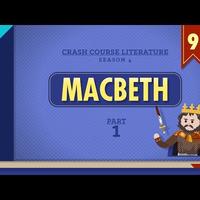Free Will, Witches, Murder, and Macbeth, Part 1: Crash Course Literature 409 - YouTube (2)
Not for the first time, the supernatural being open to human interpretation.
A dagger hovering in the air seems like a pretty good sign to go ahead with a murder
that Macbeth both desires and is horrified by.
Reading Macbeth, you have to get used to that push/pull of attraction and repulsion.
From the time the witches say, “Fair is foul and foul is fair,” this is a play full
of contradictions and double meanings.
A lot of scholars link this linguistic ambivalence to the issue of equivocation, which means
answering in ways that are deliberately unclear.
It's a method that Catholics, who were persecuted in England in Shakespeare's day, were encouraged
to adopt, chiefly via Henry Garnet's “A Treatise on Equivocation.”
Shakespeare's father was likely a Catholic, but the play suggests that there's something
evil in ambiguous speech, like the kind the witches, who speak in half-truths, use.
And it suggests the same about conflicted or ambiguous morality, like the kind Macbeth
initially practices.
But I don't think this linguistic ambivalence is just reflective of a 17th century religious
debate.
I also think it's reflective of Macbeth's psychological ambivalence,
He is both excited and afraid at the thought of becoming king via murder and that gives
us a little bit of insight into a man who begins the play as a decorated war hero and
ends it as a decapitated butcher.
We'll pick up next time with a further discussion of Macbeth's complicated and fascinating
character.
Until then, if any weird sisters approach you on a blasted heath, do not listen to them.
After all, it's not the prophesying that did the damage.
It's the believing
the prophecy.
Thanks for watching.

